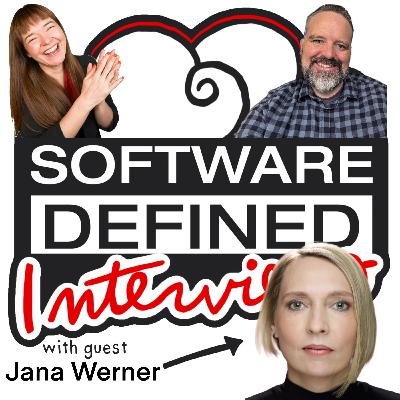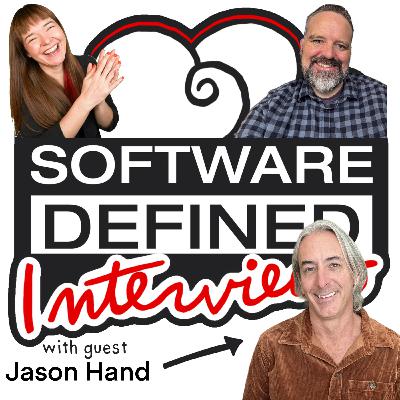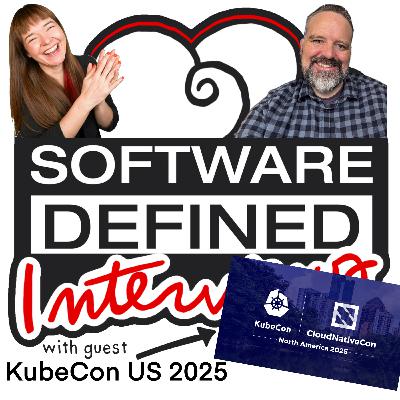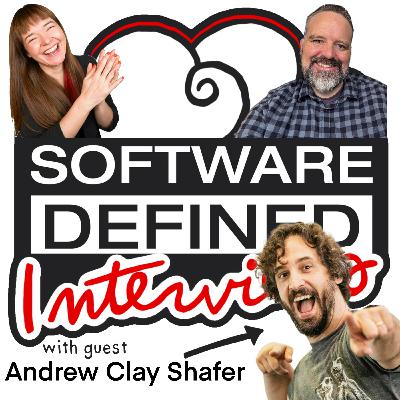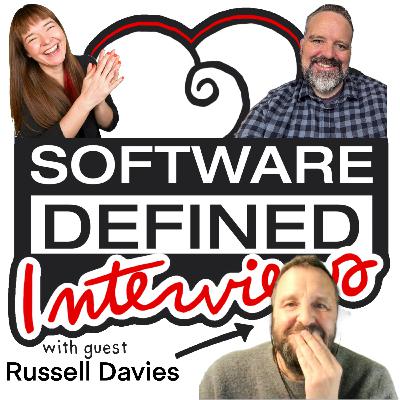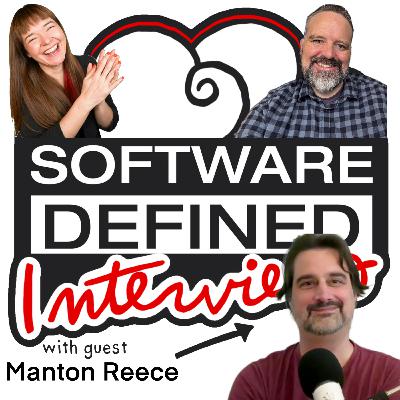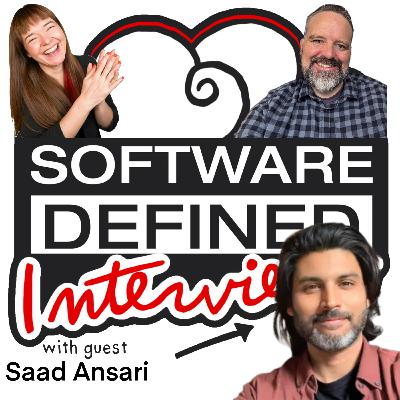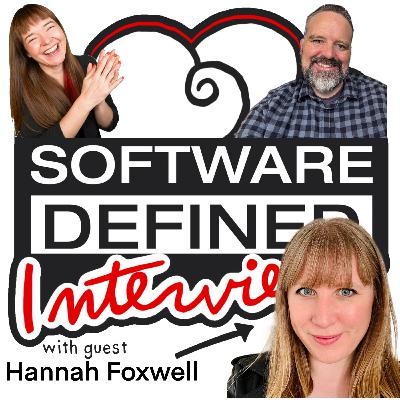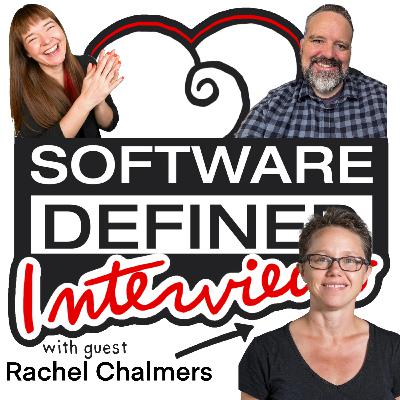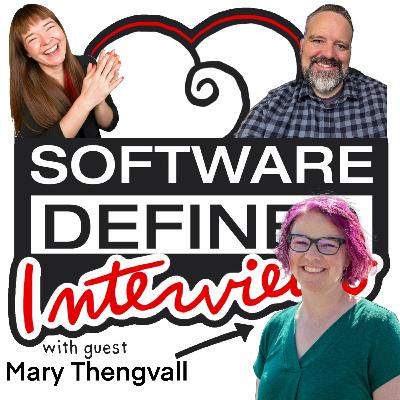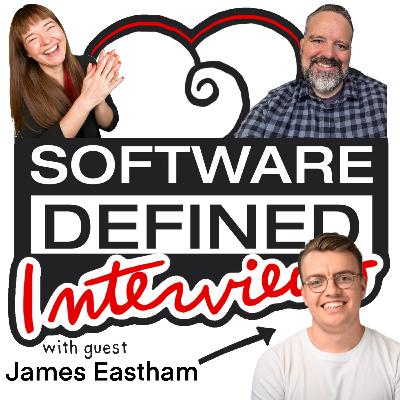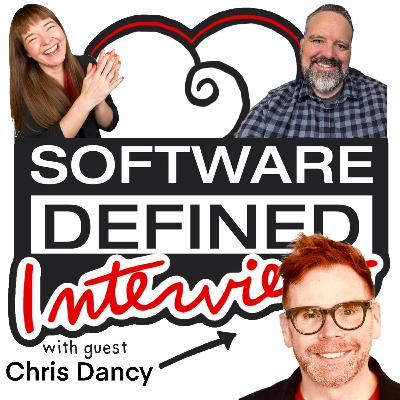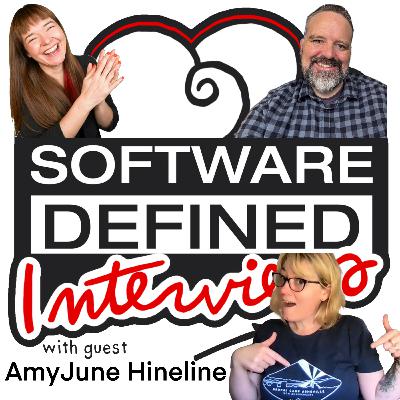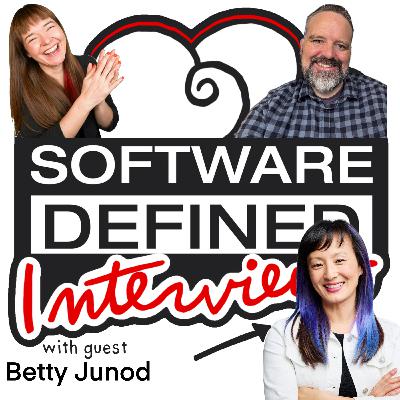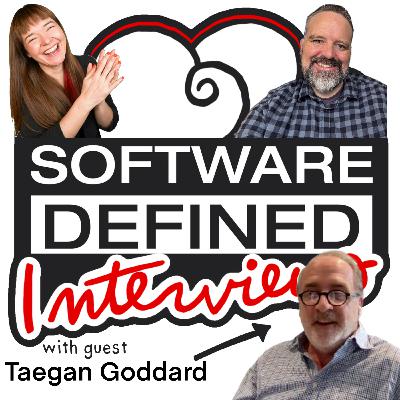Discover Software Defined Interviews
Software Defined Interviews

125 Episodes
Reverse
Whitney and Coté talk with Heidi Waterhouse, co-author of the book Progressive Delivery.
You can watch the video of the recording as well, if you're into that kind of thing.
Heidi on the World Wide Web:
LinkedIn.
Her Website.
The book, Progressive Delivery.Special Guest: Hedi Waterhouse.
Spotting talent, getting innovation adoption and driving use, open source, AI, and developing taste - those are the major topics Coté and Andrew discussed this week at the live reading. Also, a framework for creating the perfect burger. This was recorded at cfgmgmtcamp 2026, in Ghent, Belgium. Thanks to the staff for making it happen!
You can watch the video recording of this episode as well, if you're into that kind of thing.
If you missed cfgmgmtcamp this year, keep an eye on cfgmgmtcamp for next year - it's a great conference to start the year with.
Check out Andrew in LinkedIn.Special Guest: Andrew Clay Shafer.
Coté and Whitney talk with Nathen Harvey, who leads the DORA research program at Google Cloud. They talk about what 15 years of DevOps and delivery data actually says about AI. The answer feels something like "it makes you even better at what you're already good at." High-performing teams get better, while struggling teams just move faster into bottlenecks. They talk about AI-assisted software development, why throughput is rising while stability drops, how culture still beats tools, and why “user-centric” work remains stubbornly hard despite being obvious.
You can watch the video version of this episoode in YouTube, if you prefer that kind of thing.
Check out Nathen in LinkedIn.Special Guest: Nathen Harvey.
In this episode, Whitney and Coté talk with Lian, a "cloud-native human" with a 15-year career in tech. Lian discusses her transition from tech to performance art, her experiences in amateur musical theater, stand-up comedy, and improv theater. She talks about platform engineering, the importance of community building in tech, and balancing professional life with personal projects. They also cover her unique improv workshops for engineers at conferences and the popular KubeCon karaoke parties she organizes.
If you prefer video, you can watch that.
Mentions:
Lian's home page on the World Wide Web.
Lian's LinkedIn.
One of Lian's talks discussed: "Many Cooks, One Platform: Balancing Ownership and Contribution for the Perfect Broth," Lian Li, KubeCon EU 2025.
Kuberoke.
Lian's workshops.
Also, Coté on a magazine cover.
Special Guest: Lian Li.
The Octopus Organization is a great collection of organization anti-patterns. This week, one of the co-authors, Jana Werner talks with Whitney and Coté about those patterns and her own experiences. They go over topics like reading habits, the role of business books, decision making, ownership, curiosity in organizations. practical steps to avoid common corporate anti-patterns, the importance of clear communication and leadership principles, and rubber pigs.
You can also watch the video version of this episode if you prefer that kind of thing.
Check out the book, The Octopus Organization.
Also, an HBR overview article on the book.
And find Jana Werner in LinkedIn.
She's also talked with Coté a couple of other times, back in 2020 and then in 2024.Special Guest: Jana Werner.
Whitney and Coté chat with Jason Hand. They discuss the challenges and rewards of organizing conferences, the impact of the pandemic on in-person events, and the nuances of developer relations.
Jason shares his experiences with AI Tools Lab, vibe coding, and personal projects such as developing his own tools to replace commercial SaaS products. They also talk about devrel differences at large vs. mid-sized companies, and how to maintaining personal energy and sanity in high-demand roles.
Check out just about everything Jason Hand related at his home page on the World Wide Web.
If you prefer video, check out the video of this episode.Special Guest: Jason Hand.
This week, Whitney Lee joins us to discuss KubeCon news, Coding Assistants, and conference tips. Plus, vegan food and note-taking recommendations.
Watch the YouTube Live Recording of Episode 547
This is a cross-over episode with Software Defined Talk.
Whitney and Coté talk with Andrew Clay Shafer, co-founder of Puppet and principal at an advisory firm, about the nuances of DevOps transformation, open source dynamics, and running his burger restaurant, All American Burger. They talk about the challenges of integrating social and technical systems, managing metrics and KPIs, and the evolving ecosystem of open source software. Also, they go over Andrew's experience in running a fast food restaurant and the parallels between managing a tech company and a food business.
You can also watch the video version of this episode if you're into that kind of thing.
Links
Andrew in LinkedIn: https://www.linkedin.com/in/andrewclayshafer/
Ergonautic: https://www.ergonautic.ly
All American Burger: https://maps.app.goo.gl/hgNturR3jf76u5EHA
Special Guest: Andrew Clay Shafer.
We talk with Russell Davies this episode. He has done many things, above all else made lots of interesting content and messed around with producing content. Advertising, blogging and the World Wide Web of the 2000's, interesting conferences (call exactly that: interesting), books, and of late, he's been mastering the short video format. I am a big fan of Flora and his ("he's"?) recent podcast, WIP. Here is a fantastic episode.
All of Russell's stuff is to be found on his home page on the World Wide Web, those his photos take some time tracking down.
Also, Coté wears plaid on plaid. This was not done unknowingly.
Here is the video version of this episode, if you prefer that kind of thing.Special Guest: Russell Davies.
Blogs! Whitney and Coté talk with Manton Reece, founder and owner of micro.blog. They talk about journaling, the urge to write and publish, and a whole lot about blogging, social media, and how AI fits into all of that. Check out micro blog at, well, micro.blog and also Manton's blog.Special Guest: Manton Reece.
In this episode, Whitney and Coté speak with Saad Ansari, a product manager at Databricks, about his journey from working at Microsoft to co-founding a startup focused on creating sensors for monitoring cow behavior. They go over the challenges and rewards of transitioning from large corporations to startups and back, the differences in company scales, and the various lessons learned along the way. Saad shares some stories about developing technology for dairy farming, tackling supply chain issues, and the importance of passion in one's work. The conversation also touches on the unique cultural aspects of dairy farming around the world, managing imposter syndrome, and the value of hands-on experience.Special Guest: Saad Ansari.
In this episode, Whitney and Coté talk about the integration of AI into daily life with Hannah Foxwell, organizer of AI for the Rest of Us, among many other doings. They talk about stuff like practical applications of AI in daily tasks like finding recipes and tech support to the complexities of adopting AI in professional settings. Hannah also talks about building AI communities and conferences in general. Also, you hear about the upcoming conference AI for the Rest of Us.
You can also watch the video recording of this interview, if you prefer that kind of thing.
AI for the Rest of Us - https://aifortherestofus.live/london-2025
Discount code: SDI20 for 20% off the conference.
The application form for financial support: https://docs.google.com/forms/d/e/1FAIpQLSfrOR2OBJUZEJV72lmL_zXFjUyjJPul-NCoqZV4EzQnkhIe6A/viewform
Her LinkedIn: https://www.linkedin.com/in/hannah-foxwell/
Her Keynote at QCon: https://qconlondon.com/speakers/hannahfoxwell
Paper she mentioned: https://gradual-disempowerment.ai/Special Guest: Hannah Foxwell.
In this episode, Whitney and Coté talk with Rachel Chalmers. Rachel shares her experiences as an analyst, her approach to VC investing, and a little on life as a industry analyst. The conversation also touches on the evolving landscape of venture capital, the importance of psychological safety in teams, and innovative methods for engaging with early-stage startups. Also, lots of horse-talk.
You can also watch the video recording, if you're into that kind of thing.
Rachel's podcast: https://www.heavybit.com/library/podcasts/generationship
The Generationship fund: https://www.generationship.ai
Rachel LinkedIn: https://www.linkedin.com/in/rachalmers/Special Guest: Rachel Chalmers.
In this episode, Whitney and Coté chat with Mary Thengvall, exploring the development and significance of Developer Relations (devrel) over the years. They discuss the transition from tech "evangelism" to the modern devrel roles, the challenges and successes in community building, the importance of internal support for devrel teams, and the impact of AI on content creation. Mary also shares insights from her book, The Business Value of Developer Relations, and her experience with the devrel Collective community.
You can also watch the video version of this episode if you're into that kind of thing.
Links:
The Business Value of Developer Relations.
https://www.marythengvall.com/
https://www.linkedin.com/in/marythengvall/
https://www.persea-consulting.com/book
https://www.communitypulse.io/
Special Guest: Mary Thengvall.
In this episode, Whitney and Coté talk with James Eastham about developing social skills through reading, the importance of deep work in productivity, and the mental challenges of ultrarunning. They also discuss strategies for reducing screen time in an age of Internet addiction, how thumbnails in YouTube videos influence viewer engagement, and the evolving landscape of short-form video content.
Watch the video, if you prefer that kind of thing.
Mentioned in the show:
Manager versus Maker.
Deborha Tannan books: Talking 9 to 5 and You Just Don't Understand: Women and Men in Conversation.
More on James:
Website - https://jameseastham.co.uk/
LinkedIn - https://www.linkedin.com/in/james-eastham/
Bsky - https://bsky.app/profile/jameseastham.co.uk
YouTube - https://www.youtube.com/channel/UCutBMcgLfbSfRL-MB5BskxgSpecial Guest: James Eastham.
Chris, of course, had his System generate a title and summary for this episode, so we're using that AI-driven fun this week.
In this lively and open conversation, Chris Dancy — the self-proclaimed "Most Connected person in the World" — joins hosts Cote and Whitney to discuss digital minimalism, hyper-organization, life augmentation, and cyborg spirituality. The episode is a blend of humor, tech wisdom, and raw human truth. From cord-hoarding and emotional databases to AI for cold case solving and life automation, Chris opens up his digital soul with passion and presence.
The trio wanders delightfully through stories of Google Glass, Apple Vision Pro, Palmolive soap metaphors, and Grandpa Cyborg’s widget garage for municipalities. With sincerity and sparkle, Chris makes the case that life should be intentional, measurable, and ultimately — more loving.
Find all your Chris Dancy delights at his website.Special Guest: Chris Dancy.
In this episode, Whitney and Coté talk with AmyJune Hineline. They delve into Amy's diverse career, transitioning from a hospice nurse to a mechanical engineer and eventually working in tech and open source. They discuss the meticulous process of creating certification exams at the Linux Foundation, balancing altruistic and professional motivations in open source, and peering into the human aspects of her hospice work. They together AmyJune's experiences working in open source projects and working in hospice care. Also, strategies for keeping cool in the summer.
You can also watch this episode in YouTube, if you prefer that kind of thing.
AmyJune in Drupal-land.
Her LinkedIn homepage.Special Guest: AmyJune Hineline.
In this episode, Whitney and Coté discuss with Betty Junod, CMO of Heroku, the evolution of growing up without the internet to the present day's AI advancements and its implications for future generations. They explore how AI is changing critical thinking and curiosity, and how it affects children and business use cases. They also delve into workplace dynamics, such as transitioning between large tech companies and startups, leveraging frameworks to drive business goals, and the evolving role of marketers. Additionally, they talk about the nuances of using industry analysts in marketing strategies and the increasing prevalence of AI-generated content.
Check out Betty's homepage on the world wide web.
And her in LinkedIn.
You can also watch the video version of this episode if you're into that kind of thing.
Header art from Ruben de Rijcke, CC BY 3.0.Special Guest: Betty Junod.
In this episode, Whitney and Coté discuss Whitney's newfound enthusiasm for AI after a recent stint with the tool Cursor. The conversation covers how AI tools can aid in coding, building engineering journals, and even drafting compelling conference talk abstracts. They highlight the difference between tasks and prompts in AI, personalizing AI interactions, and maximizing efficiency with various MCP servers. Along the way, they delve into practical use cases for AI in professional and personal contexts, exploring its potential and limitations. (This description was generated by AI...of course!)
Check out the video recording of this episode, if you prefer that kind of thing.
Here is how ChatGPT draws Whitney, and here is how it draws Coté.
Mentions:
Whitney's MCP Commit story repo.
Whitney's Conference talk proposal AI check.
In this episode, Whitney and Coté talk with Taegan Goddard, founder of Political Wire. They talk about what drives people to go above and beyond in their work, especially journalism like Taegan does. There's some fun conversation about how Taegan runs the business, keeping up his never ending coverage. Having run the site for well over two decades, they also talk about how the back-end stack has evolved over the years. And, some notes on how to make a great cup of coffee.
Check out and subscribe to politicalwire.com, highly recommended. The blog coverage is great and the weekly, members only podcast is one of Coté's favorites.
You can watch the video version of this episode if you're into that kind of thing.Special Guest: Taegan Goddard.






